Second Lubbers cabinet
| Second Lubbers cabinet | |
|---|---|
|
60th cabinet of the Netherlands | |
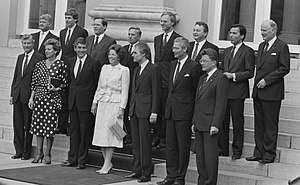 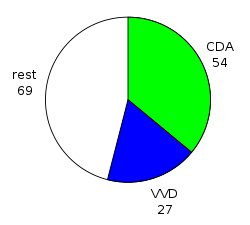 The installation of the Second Lubbers cabinet on 14 July 1986 | |
| Date formed | 14 July 1986 |
| Date dissolved |
7 November 1989 (Demissionary from 3 May 1989) |
| People and organisations | |
| Head of state | Queen Beatrix |
| Head of government | Ruud Lubbers |
| Deputy head of government | Rudolf de Korte |
| No. of ministers | 14 |
| Ministers removed (Death/resignation/dismissal) | 1 |
| Total no. of ministers | 16 |
| Member party |
Christian Democratic Appeal (CDA) People's Party for Freedom and Democracy (VVD) |
| Status in legislature | Right-wing Majority government |
| Opposition party | Labour Party |
| Opposition leader |
Joop den Uyl (1986) Wim Kok (1986–1989) |
| History | |
| Election(s) | 1986 election |
| Outgoing election | 1989 election |
| Legislature term(s) | 1986–1989 |
| Incoming formation | 1986 formation |
| Outgoing formation | 1989 formation |
| Predecessor | First Lubbers cabinet |
| Successor | Third Lubbers cabinet |
![Azure, billetty Or a lion with a coronet Or armed and langued Gules holding in his dexter paw a sword Argent hilted Or and in the sinister paw seven arrows Argent pointed and bound together Or. [The seven arrows stand for the seven provinces of the Union of Utrecht.] The shield is crowned with the (Dutch) royal crown and supported by two lions Or armed and langued gules. They stand on a scroll Azure with the text (Or) "Je Maintiendrai" (French for "I will maintain".)](../I/m/State_coat_of_arms_of_the_Netherlands.svg.png) |
|---|
| This article is part of a series on the politics and government of the Netherlands |
|
Local government |
|
The Second Lubbers cabinet was the cabinet of the Netherlands from 14 July 1986 until 7 November 1989. The cabinet was formed by the political parties Christian Democratic Appeal (CDA) and the People's Party for Freedom and Democracy (VVD) after the election of 1986. The right-wing cabinet was a majority government in the House of Representatives and was a continuation of the previous cabinet Lubbers I. It was the second of three cabinets of Ruud Lubbers (CDA) as Prime Minister, with Rudolf de Korte the former Leader of the People's Party for Freedom and Democracy serving as Deputy Prime Minister.[1]
Formation
After the election on 21 May 1986 the Christian Democratic Appeal of incumbent Prime Minister Ruud Lubbers was the winner of the election winning nine new seats and had now a total of 54 seats. The Labour Party of Joop den Uyl gained 5 seats and had now a total of 52 seats. The People's Party for Freedom and Democracy under Ed Nijpels lost nine seats and now had a total of 27 seats in the House of Representatives, following this loss Ed Nijpels resigned as Leader of the People's Party for Freedom and Democracy on 9 July 1986 and was temporarily succeeded by Rudolf de Korte. On 23 May 1986 Queen Beatrix appointed Minister of Social Affairs and Employment Jan de Koning (CDA) as Informateur to start the cabinet formation process. The previous coalition of Christian Democratic Appeal and the People's Party for Freedom and Democracy agreed to continue the coalition. On 11 July 1986 Queen Beatrix subsequently appointed incumbent Prime Minister as Formateur and tasked him with forming a new cabinet. On 14 July 1986 the cabinet formation was completed and the Second Lubbers cabinet was installed with Ruud Lubbers beginning a second term as Prime Minister and Rudolf de Korte as the new Deputy Prime Minister.
On 21 July 1986 shortly after the cabinet formation Joop den Uyl who had been the Leader of the Labour Party since 13 September 1966 announced his retirement from front line politics and stood down on 21 July 1986 after serving 19 years as Leader of the Labour Party, he was succeeded by former Trade union leader Wim Kok who had only been a Member of the House of Representatives since 3 June 1986.
Term
Changes
On 23 October 1986 State Secretary for Housing, Spatial Planning and the Environment Gerrit Brokx (CDA) resigned after Parliamentary leader of the Christian Democratic Appeal in the House of Representatives Bert de Vries lost his confidence in his ability to remain in office after a critical parliamentary inquiry. On 27 October 1986 State Secretary for Economic Affairs for international trade Enneüs Heerma (CDA) was appointed as his successor. On 30 October 1986 Member of the House of Representatives Yvonne van Rooy (CDA) was nominated to succeed him as State Secretary for Economic Affairs for international trade.
On 3 February 1987 Minister of the Interior Kees van Dijk (CDA) took a medical leave of absence after he had to undergo surgery as a result of heart problems. During his sick leave Minister of Social Affairs and Employment Jan de Koning (CDA) served as acting Minister of the Interior while State Secretary for Social Affairs and Employment Louw de Graaf (CDA) was temporarily appointed as Minister of Social Affairs and Employment. On 6 May 1987 Kees van Dijk returned from his sick leave and resumed his duties as Minister of the Interior.
On 6 September 1988 Minister of Defence Wim van Eekelen (VVD) resigned after the conclusions of a critical parliamentary inquiry into fraud was released about the he time he had served as State Secretary for Foreign Affairs in the previous cabinet. On 9 September 1988 State Secretary for Foreign Affairs René van der Linden (CDA) also resigned. Minister for Development Cooperation Piet Bukman (CDA) served as acting Minister of Defence until 24 September 1988 when Member of the House of Representatives Frits Bolkestein (VVD), the former State Secretary for Economic Affairs was appointed as Minister of Defence. On 27 September 1988 Berend-Jan van Voorst tot Voorst (CDA), who until then had been working as senior official at the Ministry of Economic Affairs was sworn in as State Secretary for Foreign Affairs.
On 30 June 1989 State Secretary for Economic Affairs for small business policy Albert-Jan Evenhuis (VVD) resigned following a publication in the NRC Handelsblad after he had provided a dubious loan and subsidy and because the cabinet was already demissionary he was not replaced.
On 14 September 1989 Minister of Education and Sciences Wim Deetman (CDA) resigned after he was appointed as Speaker of the House of Representatives. Minister of Agriculture and Fisheries Gerrit Braks (CDA) served as acting Minister of Education and Sciences until the new cabinet took office on 7 November 1989.
On 1 October 1989 one month before the new cabinet took office State Secretary for Social Affairs and Employment Louw de Graaf (CDA) resigned after he was appointed as chairman of the trade associations of Insurance Companies.
_en_Franse_minister_Girand_inspecteren_erewacht_op_het_P%2C_Bestanddeelnr_933-9519.jpg)
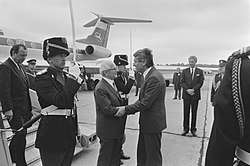
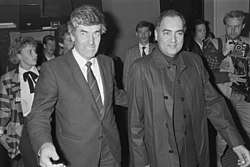
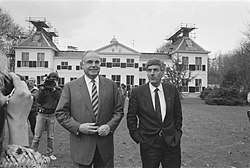
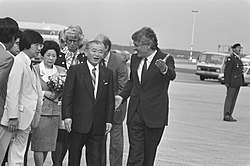
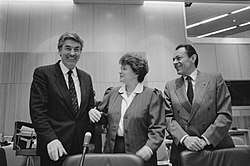
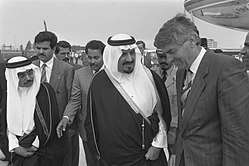
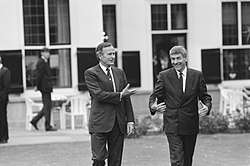
Cabinet Members
| Ministers | Title/Ministry | Term of office | Party | |||
|---|---|---|---|---|---|---|
 |
Ruud Lubbers (1939–2018) |
Prime Minister | General Affairs | 4 November 1982 – 22 Augustus 1994 [Retained] |
Christian Democratic Appeal | |
.jpg) |
Dr. Rudolf de Korte (born 1936) |
Deputy Prime Minister / Minister |
Economic Affairs | 14 July 1986 – 7 November 1989 |
People's Party for Freedom and Democracy | |
.jpg) |
Kees van Dijk (1931–2008) |
Minister | Interior | 14 July 1986 – 3 February 1987 [Note] |
Christian Democratic Appeal | |
.jpg) |
Jan de Koning (1926–1994) |
3 February 1987 – 6 May 1987 [Ad interim] |
Christian Democratic Appeal | |||
.jpg) |
Kees van Dijk (1931–2008) |
6 May 1987 – 7 November 1989 |
Christian Democratic Appeal | |||
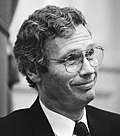 |
Hans van den Broek (born 1936) |
Minister | Foreign Affairs | 4 November 1982 – 3 January 1993 [Retained] |
Christian Democratic Appeal | |
.jpg) |
Dr. Onno Ruding (born 1939) |
Minister | Finance | 4 November 1982 – 7 November 1989 [Retained] |
Christian Democratic Appeal | |
.jpg) |
Frits Korthals Altes (born 1931) |
Minister | Justice | 4 November 1982 – 7 November 1989 [Retained] |
People's Party for Freedom and Democracy | |
.jpg) |
Dr. Wim van Eekelen (born 1931) |
Minister | Defence | 14 July 1986 – 6 September 1988 [Res] |
People's Party for Freedom and Democracy | |
.jpg) |
Piet Bukman (born 1934) |
6 September 1988 – 24 September 1988 [Ad interim] |
Christian Democratic Appeal | |||
.jpg) |
Frits Bolkestein (born 1933) |
24 September 1988 – 7 November 1989 |
People's Party for Freedom and Democracy | |||
.jpg) |
Elco Brinkman (born 1948) |
Minister | Welfare, Health and Culture |
4 November 1982 – 7 November 1989 [Retained] |
Christian Democratic Appeal | |
.jpg) |
Jan de Koning (1926–1994) |
Minister | Social Affairs and Employment |
4 November 1982 – 3 February 1987 [Retained] [Note] |
Christian Democratic Appeal | |
.jpg) |
Louw de Graaf (born 1930) |
3 February 1987 – 6 May 1987 [Ad interim] |
Christian Democratic Appeal | |||
.jpg) |
Jan de Koning (1926–1994) |
6 May 1987 – 7 November 1989 |
Christian Democratic Appeal | |||
.jpg) |
Wim Deetman (born 1945) |
Minister | Education and Sciences |
29 May 1982 – 14 September 1989 [Retained] [Appt] |
Christian Democratic Appeal | |
.jpg) |
Gerrit Braks (1933–2017) |
14 September 1989 – 7 November 1989 [Ad interim] |
Christian Democratic Appeal | |||
.jpg) |
Neelie Kroes (born 1941) |
Minister | Transport and Water Management |
4 November 1982 – 7 November 1989 [Retained] |
People's Party for Freedom and Democracy | |
.jpg) |
Gerrit Braks (1933–2017) |
Minister | Agriculture and Fisheries |
4 November 1982 – 18 September 1990 [Retained] |
Christian Democratic Appeal | |
.jpg) |
Ed Nijpels (born 1950) |
Minister | Housing, Spatial Planning and the Environment |
14 July 1986 – 7 November 1989 |
People's Party for Freedom and Democracy | |
| Ministers without portfolio | Title/Portfolio/Ministry | Term of office | Party | |||
.jpg) |
Piet Bukman (born 1934) |
Minister | Development Cooperation (within Foreign Affairs) |
14 July 1986 – 7 November 1989 |
Christian Democratic Appeal | |
.jpg) |
Jan de Koning (1926–1994) |
Minister | Netherlands Antilles and Aruba Affairs (within Interior) |
29 May 1982 – 7 November 1989 [Retained] |
Christian Democratic Appeal | |
| State Secretaries | Title/Portfolio/Ministry | Term of office | Party | |||
.jpg) |
Dieuwke de Graaff-Nauta (1930–2008) |
State Secretary | • Provincial Government Affairs • Local Government Affairs • Government Reform • Emergency Services • Disaster Management (within Interior) |
14 July 1986 – 27 May 1994 |
Christian Democratic Appeal | |
.jpg) |
René van der Linden (born 1943) |
State Secretary | • European Affairs • NATO Affairs • Benelux Affairs • International Aviation Policy (within Foreign Affairs) |
14 July 1986 – 9 September 1988 [Res] |
Christian Democratic Appeal | |
 |
Baron Berend-Jan van Voorst tot Voorst (born 1944) |
27 september 1988 – 7 november 1989 |
Christian Democratic Appeal | |||
.jpg) |
Henk Koning (1933–2016) |
State Secretary | • Fiscal Affairs • Tax and Customs Administration • Local Government Finances • State Lottery (within Finance) |
4 November 1982 – 7 November 1989 [Retained] |
People's Party for Freedom and Democracy | |
.jpg) |
Virginie Korte-van Hemel (1929–2014) |
State Secretary | • Integration • Immigration • Asylum Affairs • Youth Justice • Copyright Law • Rehabilitation • Minority Affairs (within Justice) |
8 November 1982 – 7 November 1989 [Retained] |
Christian Democratic Appeal | |
.jpg) |
Enneüs Heerma (1944–1999) |
State Secretary [Title] |
• International Trade • Export Promotion • Competition Policy (within Economic Affairs) |
17 July 1986 – 27 October 1986 [Appt] |
Christian Democratic Appeal | |
.jpg) |
Yvonne van Rooy (born 1951) |
30 October 1986 – 7 November 1989 |
Christian Democratic Appeal | |||
.jpg) |
Albert-Jan Evenhuis (1941–2011) |
State Secretary | • Small Business Policy • Retail Policy • Regional Development • Consumer Protection • Tourism Affairs (within Economic Affairs) |
14 July 1986 – 30 June 1989 [Res] |
People's Party for Freedom and Democracy | |
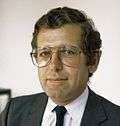 |
Jan van Houwelingen (1939–2013) |
State Secretary | • Personnel Affairs • Equipment Policy • Veteran Affairs (within Defence) |
14 September 1981 – 7 November 1989 [Retained] |
Christian Democratic Appeal | |
.jpg) |
Dick Dees (born 1944) |
State Secretary | • Social Services • Environmental Policy • Sport (within Welfare, Health and Culture) |
14 July 1986 – 7 November 1989 |
People's Party for Freedom and Democracy | |
.jpg) |
Louw de Graaf (born 1930) |
State Secretary | • Social Security • Unemployment Affairs • Occupational Safety • Youth Policy • Elderly Policy • Poverty Policy • Disability Affairs (within Social Affairs and Employment) |
5 November 1982 – 3 February 1987 [Retained] [Note] |
Christian Democratic Appeal | |
| 6 May 1987 – 1 October 1989 [Res] | ||||||
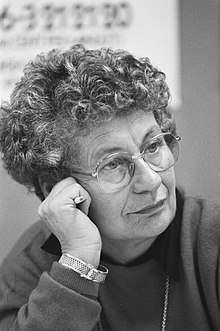 |
Nell Ginjaar-Maas (1931–2012) |
State Secretary | • Primary Education • Secondary Education • Adult Education (within Education and Sciences) |
5 November 1982 – 7 November 1989 [Retained] |
People's Party for Freedom and Democracy | |
.jpg) |
Gerrit Brokx (1933–2002) |
State Secretary | • Urban Planning • Public Housing • Spatial Planning (within Housing, Spatial Planning and the Environment) |
5 November 1982 – 23 October 1986 [Retained] [Res] |
Christian Democratic Appeal | |
.jpg) |
Enneüs Heerma (1944–1999) |
27 October 1986 – 22 August 1994 |
Christian Democratic Appeal | |||
| Source: (in Dutch) Kabinet-Lubbers II Rijksoverheid | ||||||
- Retained Retained this position from the previous cabinet.
- Res Resigned.
- Ad interim Served ad interim.
- Appt Appointment: Enneüs Heerma appointed State Secretary for Housing, Spatial Planning and the Environment; Wim Deetman appointed Speaker of the House of Representatives.
- Title Allowed to use the title of Minister while on foreign business.
- Note Kees van Dijk took a medical leave of absence, Jan de Koning served as Minister of the Interior from 3 February 1987 until 6 May 1987. State Secretary Louw de Graaf served as Minister of Social Affairs and Employment in that time.
References
- ↑ (in Dutch) "De jaren tachtig van Onno Ruding". Historisch Nieuwsblad. 19 August 2001. Retrieved 16 February 2018.
External links
- Official
- (in Dutch) Kabinet-Lubbers II Parlement & Politiek
- (in Dutch) Kabinet-Lubbers II Rijksoverheid
| Wikimedia Commons has media related to Cabinet Lubbers II. |